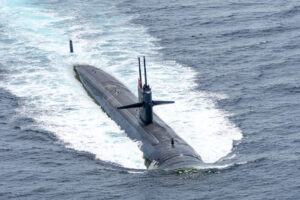The recent agreement in which the United States and United Kingdom will support Australia in acquiring a fleet of nuclear-powered submarines is a major shot in the arm for regional stability and a counterweight to China in the Indo-Pacific region. However, the strategic value of AUKUS cannot be fully realized without the building of trusted international business-to-business partnerships and a work-around of the International Traffic in Arms Regulations (ITAR) to facilitate technology transfer.
The details of the agreement known as AUKUS (an acronym for Australia, U.K. and the U.S.), which the leaders of the three nations announced last month in San Diego, include two so-called pillars. The first is the planned purchase by Australia of three to five conventionally armed Virginia-class attack submarines. The second is the cooperation among the partners on critical technologies, including cyber capabilities, artificial intelligence, hypersonic and counter-hypersonic programs.
The prospect of an enduring nuclear-powered submarine capability in Australia heralds a new age of military cooperation in the Indo-Pacific region that is as momentous as the signing of the Australia, New Zealand and United States Security Treaty in 1951 – an agreement that underpins the U.S. and Australian alliance to this day.
The implications for the Australian defense sector are immense. Australia has committed up to the equivalent of $240 billion to acquire, operate and maintain the nuclear-powered subs and their associated infrastructure, and that is just for Pillar 1. The scale of investment in support of the Pillar 2 advanced technologies is yet to be announced, but will no doubt be similarly substantial.
The breadth of this sprawling commitment means that there has never been a better time for U.S. and British businesses to collaborate with the Australian defense market, especially small and medium enterprises. These smaller companies account for half of GDP in the AUKUS nations and form the entrepreneurial backbone of their economies, creating jobs and driving innovation. They are uniquely positioned to support AUKUS goals due to their agility, adaptability and responsiveness, as well as their focused expertise, smaller workforces and willingness to adapt or die.
Micro partnerships can enable deep collaboration
U.S. companies seeking to operate in Australia will face significant difficulties when compared to local companies, including such issues as: slow access to skilled migration or temporary work visas; limited access to digital security infrastructure; cumbersome procurement requirements; a lack of knowledge about Australian policies and processes; and ITAR obstacles.
Furthermore, U.S. companies may have trouble gaining recognition of security clearances and program participation and have a poor understanding of local work, health and safety statutory requirements. Finally, they may suffer from lack of market trust and difficulty accessing smaller business networks.
The good news is that cross-border partnerships between the smaller to mid-size U.S. and Australian companies can help with many of these issues and have the potential to deliver big results for relatively small investment and lower overhead costs.
Specifically, micro-partnerships can enable the pooling of capabilities, increased flexibility, tech transfer, access to expertise and knowledge and guided access to Australia’s growing defense market. Micro-partnerships are small scale, low cost, collaborations between companies for mutual benefit. Smaller to mid-size companies in particular can benefit from micro-partnerships, using the existing networks of their partners to achieve their objectives. By co-working with complementary skills and capabilities, both parties can benefit from shared expertise and learn together, leading to more innovative outcomes.
Put simply, the AUKUS is the perfect opportunity for smaller U.S. and Australian companies to grow together and ensure that the whole of their capability is more than the sum of their individual parts. We need to facilitate the creation of these partnerships as soon as possible so they are in place well in time to help guarantee the success of AUKUS.
Managing ITAR obstacles
The implementation of AUKUS faces regulatory, legislative and bureaucratic barriers, including ITAR, a set of U.S. regulations that control the manufacture, sale, export and import of defense-related articles and services. Although ITAR has its purposes in protecting national security, it is an impediment to the success of AUKUS. Short of legislating around ITAR, the best shot at expediting AUKUS is the Australia-U.S. Defense Trade Cooperation Treaty.
The treaty came into force in 2013 and aims to improve the efficiency of two-way transfers of controlled goods by facilitating their export within an approved community without an export license. The treaty is limited to approved organizations, with benefits including reduced delivery time, improved sustainment, more efficient sharing of technical data and consistent compliance requirements.
Since the approved community comprises an Australian community and a U.S. community, managed by their respective governments, we should advocate for this treaty as a viable work-around, including the maintenance of current end-user lists.
The work begins now
As the CEO of an Australian defense, engineering, professional services and advisory consultancy, there is no higher priority for me than forging partnerships with U.S. companies that are going to deliver on the promise of AUKUS. Industry can mobilize faster than government, and the work to prepare industry begins now—which is why I will be travelling from Australia to the D.C. region to attend the Sea Air Space convention and discuss my new white paper, “Micro-partnerships in the Age of AUKUS,” expanding upon the themes I have touched on here.
The AUKUS agreement is the culmination of more than 100 years of military cooperation between the United States, Australia, and Britain—stretching back to the Battle of Hamel in 1918 when U.S. and Australian Army infantry successfully engaged German-held positions with support from British armor.
Together, with U.S. and U.K. companies working alongside Australian partners, we can forge a stronger, more secure and prosperous Indo-Pacific.







